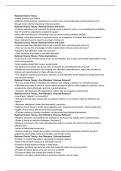Class notes
An Examination of Strain Theories and Institutional Anomie in Criminology
- Course
- (SOSC3654)
- Institution
- York University (Ebor )
In the realm of criminology, the discourse around strain theories and Institutional Anomie Theory (IAT) holds a significant place. The narrative begins with Merton's Strain Theory, which is critiqued for its oversimplified view of societal aspirations toward pecuniary success, especially in a diver...
[Show more]



